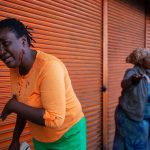How Toni Morrison can help us fight xenophobia
Xenophobia is festering in South Africa, stoked by the actions of the state itself. How do we stop violence against migrants? The thoughts and words of the late Toni Morrison can help.
Author:
12 August 2019

Six days after Donald Trump was announced as president-elect of the United States of America, The New Yorker ran a feature article entitled Aftermath: Sixteen Writers on Trump’s America.
Toni Morrison was among the featured writers.
Her contribution was titled Making America White Again. The decision to name the article this way was clearly rooted in sobering wordplay that pointed out the racist and divisive campaign mounted by Trump in his claims to “Make America Great Again”.
In the piece, Morrison lambasted the crude iterations of American xenophobia undergirded by white supremacy. “The United States holds whiteness as a unifying force,” she wrote with tempered derision. “All immigrants to the United States know (and knew) that if they want to become real, authentic Americans they must reduce their fealty to their native country and regard it as secondary, subordinate, in order to emphasize their whiteness”.
Related article:
Three years later, and after her death last week, Morrison’s words still feel eerily resonant. This whiteness which is shorthand for white supremacy is a form of national identity buttressed by guns, violence and oppression. It has placed white fear above all else.
The threat of immigration is so real and so debilitating for white fear that mass shootings, the illegal rounding up of immigrants and the worsening state of detention centres has become part of the fabric of American life and the cornerstone of Trump’s supposed “greatness”. The message of insiders versus outsiders is clear.
On our own shores a similar message has taken root. The phenotype is different but the politics are the same. As in Trump’s America, migrants have become the convenient scapegoat .
The state metes out violence
Organised police operations with the intention to eradicate informal enterprises have become commonplace and the vehicle with which to mete out violence on migrants. The language of criminality is often used when sanctioning the force of the police.
In 2012 for instance, the police in Limpopo launched a campaign called Operation Hardstick to apprehend criminals and tackle illicit activities in the province. In practice however, this campaign targeted small informal businesses run by migrants and refugees. The police closed over 600 businesses in a series of raids under this exercise.
Business owners also had their stock confiscated, were detained, received fines for trading without permits and were showered with verbal abuse by police officials. Despite its label as a crime-fighting initiative, Hardstick was selectively enforced, affecting only migrant businesses and not South African businesses in the same location. Thirty migrants from Ethiopia were displaced as a result of these raids and were forced to flee when the house they had taken refuge in was firebombed.
Related article:
Two years later, in the landmark case of Somali Association of South Africa and Others v Limpopo Department of Economic Development, Environment and Tourism and Others, claims were made in an affidavit indicating that the police actions told “the story of the most naked form of xenophobic discrimination and of the utter desperation experienced by the victims of that discrimination”. The Supreme Court judgment observed that “one is left with the uneasy feeling that the stance adopted by the authorities in relation to the licensing of spaza shops and tuck shops was in order to induce foreign nationals who were destitute to leave our shores”.
All three tiers of government – national, provincial and municipal – opposed the appeal. Among them were the Limpopo Member of the Executive council (MEC) for Safety, Security and Liaison, the Provincial Commissioner of Police, the National Police Commissioner, the standing Committee on Refugee Affairs and the Ministers of Police, Labour and Home Affairs. In its judgment in favour of the appellants and against the state, the Supreme Court found that the manner in which the respondents conducted the litigation was “disconcerting”. The Supreme Court found that respondents “avoided dealing with any specific allegations of maltreatment raised by the appellants”.
While the case represents a significant victory for refugees and asylum seekers, the Hardstick affair is symptomatic of an endemic problem: the myriad regulatory and legal obstacles and the culture of state impunity that confront small migrant businesses not just in Limpopo, but throughout South Africa.
The state’s anti-migrant stance
There has been no short supply of crime-busting exercises across the country. From Hardstick in Limpopo to Fiela in Gauteng, which was enforced by the government in 2015 and then relaunched in 2018 by then police minister, Fikile Mbalula, to its newest iteration with O Kae Molao. All these operations have operated on the same continuum of state- sanctioned derision towards and violence against migrants.
An increasingly xenophobic public discourse seems to have created a culture of impunity and abuse by officials. As Jan Bornman reports, on 7 August a large police contingent with officers from as far as Lyttleton and Pretoria West in Tshwane and KwaThema on the East Rand, as well as plainclothes officers armed with rifles, descended on the Fashion District in Johannesburg. The police raid, part of operation O Kae Molao, was followed by right-wing populist violence by a mob of looters.
Related article:
On the Women’s Day edition of News Feed, a Newzroom Afrika programme hosted by Thulasizwe Simelane, the Minister of Home Affairs, Aaron Motsaledi, emphasised the language of criminality when referring to these recent raids. He argued that the operation “was not directed at foreign nationals, but rather was directed at criminality”. He also said that Operation Fiela and Operation O Kae Molao “were more or less the same thing”.
Xenophobic language from the state legitimates both police abuses and mob violence. The relentless conflation of migrants and criminals has now opened the door for ordinary citizens to evict migrants from their homes. On Saturday 10 August, three days after the raids in the CBD, vigilante groups formed in Orange Grove with a mission to evict “foreigners” from houses alleged to have been “hijacked” from the Johannesburg Property Company (JPC). A group calling themselves “concerned residents of Orange Grove and Alexandra” evicted several families they had identified as being “foreign” and who were allegedly occupying the houses owned by the JPC “illegally”. One of the “concerned residents” was reported as saying the group wanted the “right people” to occupy the houses.
The phrase “right people” is coded. It is a retreat into a national jingoism that undergirds the kind of political ecosystem that enables institutional mistreatment of “foreign nationals” and the often palpable threat of criminality and violence in their lives. The latter is seen in the relentless torching and looting of immigrant-owned spaza shops throughout the country, and now in the forceful evictions from their homes. Often African and Asian immigrants are cast outside the orbit of “human” and so a set of basic human rights are not afforded to them.
Fighting the policing of language
The stories we tell about people have material ramifications for their livelihood.
Morrison took the task of storying our worlds extremely seriously. The words that were the brick and mortar of those worlds had to be chosen with absolute finesse and precision. She conceived of writing as a form of thinking, discovery, selection, order and meaning. As Danielle Bowler writes, “Language was Morrison’s most extraordinary talent, weapon and interest, as she sought to think through its dimensions and its power, not only wanting to wield it, but also to understand and expand its possibilities.” In her obituary, Emma Goldberg offers a similar sentiment to Bowler in writing that “Morrison believed in a language more political than poetic”.
Related article:
After all, as Morrison warns, “Oppressive language does more than represent violence; it is violence; does more than represent the limits of knowledge; it limits knowledge. Whether it is obscuring state language or the faux-language of mindless media; whether it is the proud but calcified language of the academy or the commodity-driven language of science; whether it is the malign language of law-without-ethics, or language designed for the estrangement of minorities, hiding its racist plunder in its literary cheek – it must be rejected, altered and exposed.
“It is the language that drinks blood, laps vulnerabilities, tucks its fascist boots under crinolines of respectability and patriotism as it moves relentlessly toward the bottom line and the bottomed-out mind. Sexist language, racist language, theistic language – all are typical of the policing languages of mastery, and cannot, do not permit new knowledge or encourage the mutual exchange of ideas.”




